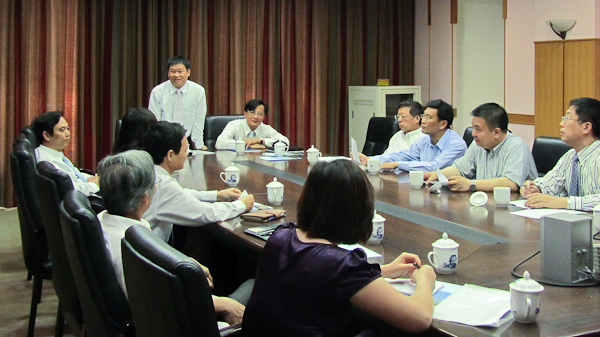The delegation of the University of Social Sciences and Humanities (Hanoi) led by Associate Professor, Dr. Vu Duc Nghieu has just concluded a visit and working trip to Shanghai University and Fudan University (China) from May 16 to 21, 2011.Welcoming the delegation of the University of Social Sciences and Humanities at Shanghai University were Professor Li Wei, Vice President and Dean of the Graduate School of the University, Heads of the Training and International Relations Departments, and representatives of many faculties and institutes in the university. Shanghai University was first built in 1922 and rebuilt in 1994. This is a training facility in the Chinese government's 211 project to build 100 key universities. Shanghai University has 23 institutes and 01 affiliated Faculty of Architecture, 68 undergraduate majors, 145 master's majors, and 52 doctoral majors. The training majors are diverse, from natural sciences, social sciences, arts to applied sciences. The total number of staff is nearly 5,500, of which 2,800 are lecturers. Shanghai University has 482 professors, 765 associate professors and 10 academicians. Currently, the school is training over 43,000 students, including more than 10,000 postgraduates, 10,000 part-time students, and about 3,000 international students. According to Professor Li Wei, Shanghai University accepts international students from 93 countries to study. Of which, at its peak, there were more than 100 Vietnamese international students. Associate Professor Dr. Vu Duc Nghieu briefly introduced the activities of the University of Social Sciences and Humanities, especially emphasizing the potential for training in Vietnamese linguistics. The school has trained about 5,000 international students, many of whom have become ambassadors of countries in Vietnam, including Chinese ambassadors Ho Can Van, Li Gia Trung, Te Kien Quoc... Currently, there are about 300 Chinese international students. During the meeting, the two schools discussed many issues of mutual concern regarding the organizational structure, the method of operating a university, administrative management, training management, scientific research using information technology and according to output standards. At the same time, they provided each other with a lot of information about policies on talent treatment, scholarship regimes, tuition fees, study conditions for foreign students, development orientation of key industries, the mechanism of awarding academic titles and degrees at each agency...

Welcoming the delegation of the University of Social Sciences and Humanities at Fudan University were the Vice President of the University, Prof. Dr. Jin Li, along with the Head of the Department of Social Sciences and Humanities, the Head of the Department of International Relations, and representatives of many faculties and departments in the university. Fudan University was founded in 1905, the first private university in modern Chinese history. On December 25, 1941, the Government of the Republic of China decided to convert Fudan into a public university. In 2000, Shanghai Medical University was merged into Fudan University, creating a prestige for this university with 10 hospitals and teaching facilities. After 100 years of development, Fudan University has now become a comprehensive university with social sciences and humanities, natural sciences, engineering sciences, management sciences and medical sciences... and is currently in the top 200 most famous universities in the world. Fudan University has more than 2,600 lecturers, including 1,400 professors and associate professors, 36 academicians and is one of the earliest universities to admit international students in China. Currently, the number of international students studying at the university is more than 3,500, coming from nearly 100 countries and regions around the world. Many majors in the university are taught in English such as economics, politics, diplomacy, society, history, Chinese culture... Fudan University is very interested in training and researching Han Nom, as well as Chinese literature in Vietnam. In addition, the two sides also share many experiences in training, fostering and improving professional qualifications and management capacity for lecturers and management leaders, linking between majors in the university, attracting financial resources and human resources to serve the development of the university. The visit and working session of the delegation of the University of Social Sciences and Humanities has tightened, promoted and brought the cooperation in training and research between the University of Social Sciences and Humanities, Hanoi and leading universities in China to a new level, more comprehensive and effective.

